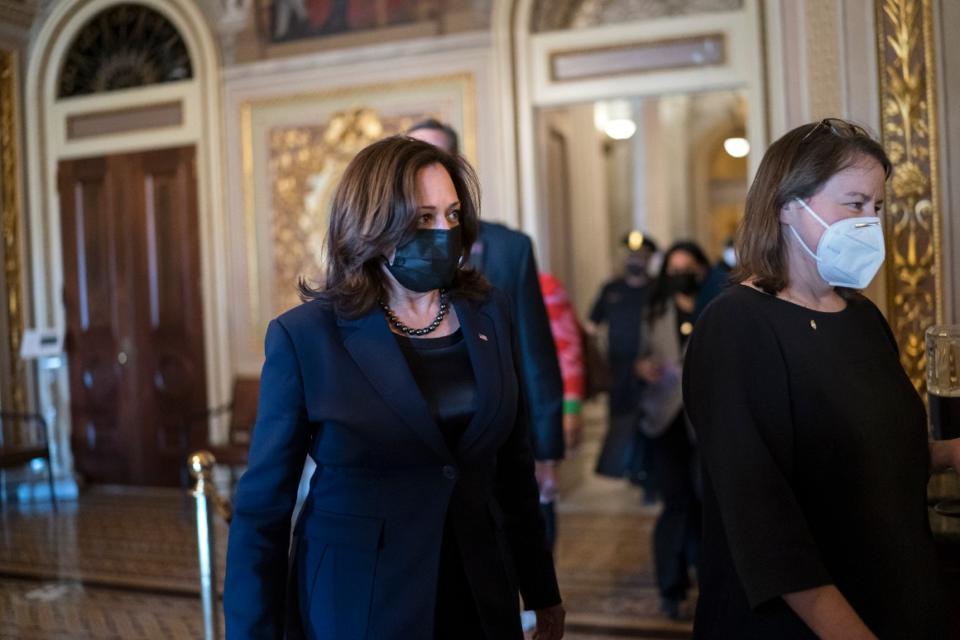Senate poised to pass $1.9 trillion Covid aid bill
Senate Democrats are on track to approve President Joe Biden’s $1.9 trillion coronavirus relief bill by midday Saturday after clinching a deal Friday night over unemployment benefits.
The Senate voted all night Friday on amendments to the package, dragging debate into Saturday morning. Facing last-minute resistance to unemployment aid, Democratic leaders struck a deal with Sen. Joe Manchin (D-W-Va.) to provide $300 a week in extra unemployment benefits through Sept. 6 and up to $10,200 in tax relief for unemployed workers.
“The president has made it clear we will have enough vaccines for every American by the end of May, and I am confident the economic recovery will follow," Manchin said after calling a truce Friday night. "We have reached a compromise that enables the economy to rebound quickly."
Democratic leaders also agreed to limit eligibility for that tax relief, restricting the tax-free status of the benefits to households with incomes under $150,000 a year. The White House quickly announced its backing.
"The President supports the compromise agreement, and is grateful to all the senators who worked so hard to reach this outcome,” White House press secretary Jen Psaki said in a statement on Friday night.
As of Saturday morning, the Senate had been in session for more than 24 hours straight, with the vote-a-rama taking up most of the time and with several more hours to go. Senate Democrats largely stuck together throughout the night and staved off GOP efforts to drastically change the bill. While some Democrats defected on a handful of GOP amendments, those amendments required 60 votes to pass.
Democrats also sidestepped a quagmire on undocumented immigrants that infuriated liberals last month after some moderates supported a proposal barring those immigrants from receiving checks. All 50 Democrats banded together to reject an amendment from Sen. Ted Cruz (R-Texas) to bar relief payments from going to undocumented immigrants.
Senate Majority Whip Dick Durbin (D-Ill.) said it was "just plain false" to suggest those immigrants could get a stimulus check. When Cruz asked him to yield for a question, Durbin turned his back on Cruz and spoke directly to his Democratic colleagues.
In addition to the Senate approving the Democratic agreement on unemployment insurance, Senate Democrats also passed an amendment from Sen. Maggie Hassan (D-N.H.) that would require schools that receive aid from the package to publish plans for safely returning to in-person instruction. The amendment was an effort to counteract a proposal from Sen. Marco Rubio (R-Fla.) that would have allocated more funds for schools that reopen for in-person learning than schools opting for remote instruction. With Sen. Dan Sullivan (R-Alaska) absent due to a death in his family, Democrats did not need Vice President Kamala Harris to break tie votes.
Following Senate passage, the bill will go back to the House, where lawmakers must approve the changes before it reaches Biden’s desk.

The two parties spent Friday afternoon battling for Manchin's support on changes to federal unemployment benefits, showcasing how a 50-50 Senate can instantly swing power to one holdout.
Before the Senate started voting on amendments, Majority Leader Mitch McConnell reveled in what he called the “spectacle” of Democratic disagreement over one of the package’s biggest provisions. McConnell then forced a vote to adjourn for the night, which failed.
The version of the bill passed by the House last week would have raised the current weekly payment from $300 to $400, extending that benefit through August.
But earlier Friday, Senate Democrats agreed to an amendment from Sen. Tom Carper (D-Del.) that would have lowered the benefit to $300 and extended it through the end of September, in addition to providing up to $10,200 in tax relief for laid-off workers without any income restrictions.
The latest deal means that federal unemployment benefits will now expire on Labor Day, when the Senate is scheduled to be in recess. The prior deal would have ensured that benefits expired closer to a government funding deadline at the end of September, providing a natural legislative vehicle if another extension is needed.
The protracted delay in the Senate came as Manchin weighed a proposal from Sen. Rob Portman (R-Ohio) that would have extended the $300 unemployment benefits until July 18 — amounting to a cut from both Carper‘s proposal and the House bill.
Earlier, the Senate passed Portman’s unemployment amendment to extend $300 weekly benefits through July, with Manchin voting in support as expected, 50-49. But that amendment was canceled out by the Manchin compromise, which Sen. Ron Wyden (D-Ore.) offered as an amendment and Manchin also supported.
The first amendment on raising the minimum wage to $15 hourly by 2025 — offered by Senate Budget Chair Bernie Sanders (I-Vt.) — failed as expected, illustrating a broader divide over the issue between progressives and moderates in the Democratic caucus.
The protracted vote-a-rama is widely despised by members of both parties and guaranteed to leave sleepless members running on fumes just ahead of the bill’s passage in the upper chamber. But there's no way around it.
Senate Majority Leader Chuck Schumer vowed that the Senate would "power through and finish this bill, however long it takes."
"We’re not going to make the same mistake we made after the last economic downturn, when Congress did too little," he said on the floor.
The legislative endurance run is part of the budget reconciliation process, which Democrats are using to pass Biden’s plan without the need for GOP support.
“The whole term 'vote-a-rama' has never sounded to me like it should apply to the ‘world’s greatest deliberative body,’” Sen. Roy Blunt (R-Mo.) said on Thursday. “It is what it is and it always turns into a largely partisan exercise.”

